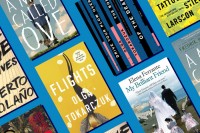
Your Complete Guide to Popular Literary Devices in Great Writing
bookriot.com – Thursday May 16, 2019

We all know what it means to read “good writing,” right? Well, no, we don’t. It’s true that we often recognize something as “great” when we see it. Our teachers may reference the “literary devices” that make it good. But if you have to talk about a book in a class, it can be hard to describe “greatness.” This is even more nerve-wracking on a test or quiz. I can’t just write “I liked it” and move on!
WHAT ARE LITERARY DEVICES?
One of the best ways to connect deeply with texts when you are just learning about how to define good writing is through literary devices. Literary devices are like strategies or techniques that a writer can use. They showcase creative thought and connections between things that might otherwise not be connected. When we notice a great connection being made, we get the opportunity to share it with others in our classes or among our friends who also are reading such a book.
Below are just a few of the literary devices you may encounter as you delve into the great works of literature. You might also notice variations of them in your reading for pleasure, and thinking about literary devices may allow you to marvel even more at the genius of your favorite authors.

Rankin and Cleeves to headline Bute Noir crime writing festival
thebookseller.com – Thursday May 16, 2019

Ian Rankin and Ann Cleeves will headline this summer's Bute Noir crime writing festival.
Authors Mark Billingham, Denise Mina, Stuart MacBride, Chris Brookmyre, Ruth Ware and Mick Herron will also join the line-up for the festival in Rothesay, which takes place from Friday 2nd August 2 to Sunday 4th August.
Organisers have also signed up authors Oscar de Muriel from Mexico, Lilja Sigurdardottir from Iceland, Thomas Enger from Norway, Alexandra Sokoloff from the USA, and Liz Nugent from Ireland as well as leading Scottish talent including Alex Gray, Lin Anderson and Craig Robertson.

Jeffery Deaver interview: The secrets of writing a bestseller
cambridgeindependent.co.uk – Wednesday May 15, 2019

Thriller writer Jeffery Deaver was penning award nominated novels - but for some reason they weren’t selling.
After his sixth book - a mystery in the Poirot vein - came out to critical acclaim, but little money, he knew he had to act.
“They were well received, but they didn't do extremely well in terms of sales. Then I re-read them and I realized they weren’t as good as I had hoped,” says Jeffery.
That’s when he began working on something he calls his ‘mint toothpaste’ business plan.
“I’m a big list maker and I was aware that I needed to be more scientific about it. So it was in my late 30s I outlined a book for the first time - after writing half a dozen. That book was exponentially better and so I have been following that model ever since.”

How to write a novel – four fiction writers on Danielle Steel’s insane working day
– Wednesday May 15, 2019

She might be the world’s most famous romance writer, nay the highest selling living author bar none, but there’s little room for flowers and chocolates in Danielle Steel’s writing regime. In a recent interview she laughed at the idea of young people insisting on a work-life balance, and has claimed she regularly writes for 20 to 22 hours a day, and sometimes 24. The result: 179 books in under 50 years, selling about 800m copies.
Some aspiring novelists might just have cancelled their entire lives to get on the Steel plan, but many more are probably wondering if it’s time to try something less demanding. We asked four creative writing teachers for their perspective:

ICM Partners join forces with Curtis Brown Creative for writing course
thebookseller.com – Wednesday May 15, 2019

US agency ICM Partners and Curtis Brown Creative are teaming up to launch a six-month online novel-writing course.
The course, which starts in September, will provide 15 writing students with the opportunity to connect with literary agents from the US and UK and the chance to glean knowledge and industry insights from US and UK publishing perspectives.
ICM Partners have worked with Curtis Brown for more than 10 years on UK and translation rights representation and now ICM literary agents Heather Karpas and Zoe Sandler will take part in 'agent days' during the creative writing school's new course.
New Publisher Listing
firstwriter.com – Wednesday May 15, 2019
Publishes: Fiction; Poetry;
Markets: Adult;
Preferred styles: Literary
Publishes fiction and poetry collections. Particularly interested in collaborative / transmedia pieces. Send submissions by email with author bio / resume.
New Publisher Listing
firstwriter.com – Monday May 13, 2019
Publishes: Fiction;
Areas include: Fantasy; Historical; Romance; Sci-Fi; Short Stories;
Markets: Adult;
Preferred styles: Contemporary
Publishes creative LGBTQIA (lesbian, gay, bisexual/pansexual, trans, queer, intersex, asexual/aromantic/agender) romances in any genre. Accepts submissions of novels up to 200,000 words and short stories and novellas of at least 10,000 words. See website for full submission guidelines.
New Literary Agency Listing
firstwriter.com – Thursday May 9, 2019
Handles: Fiction; Nonfiction
Areas: Biography; Business; Cookery; Crime; Culture; Current Affairs; Film; Finance; Historical; Legal; Lifestyle; Medicine; Music; Philosophy; Politics; Psychology; Science; Self-Help; Sociology; Sport; Technology; Travel; TV
Markets: Adult; Children's
Treatments: Literary
Send query by email with first ten pages in the body of the email (or full manuscript for picture books). No attachments. See website for full guidelines.
New Magazine Listing
firstwriter.com – Wednesday May 8, 2019
Publishes: Articles; Fiction; Nonfiction; Poetry;
Areas include: Short Stories;
Markets: Adult;
Preferred styles: Literary
Publishes poetry, fiction, creative nonfiction, and opinion / editorial pieces. Submit up to five poems or prose up to 10,000 words.

Will Translated Fiction Ever Really Break Through?
vulture.com – Tuesday May 7, 2019

In May 2018, Olga Tokarczuk and her translator Jennifer Croft won the Man Booker International Prize for Flights, a novel that was published in Poland in 2007. Drive Your Plow Over the Bones of the Dead, for which Tokarczuk is a Booker finalist again this year, was translated a bit faster; it only took a decade. One of the biggest stars in translation of this century, Roberto Bolaño, author of 2666 and The Savage Detectives, fared no better. Back in 2003, when New Directions put out his first translated book, By Night in Chile, Bolaño had already passed away; he was a famous writer by then, at least in Spanish.
The process of literary translation takes time, obviously, but there’s something else at play when it takes a decade or more for incredibly renowned authors to reach our shores. This is part of a much larger problem, frequently referred to as the “3 percent problem” by publishers of translation (like myself), which should be troublesome to anyone who believes the world is better off when cultures are in conversation with one another.
Get the free newsletter | Submit a news item or article | Get Writers' News for your website





